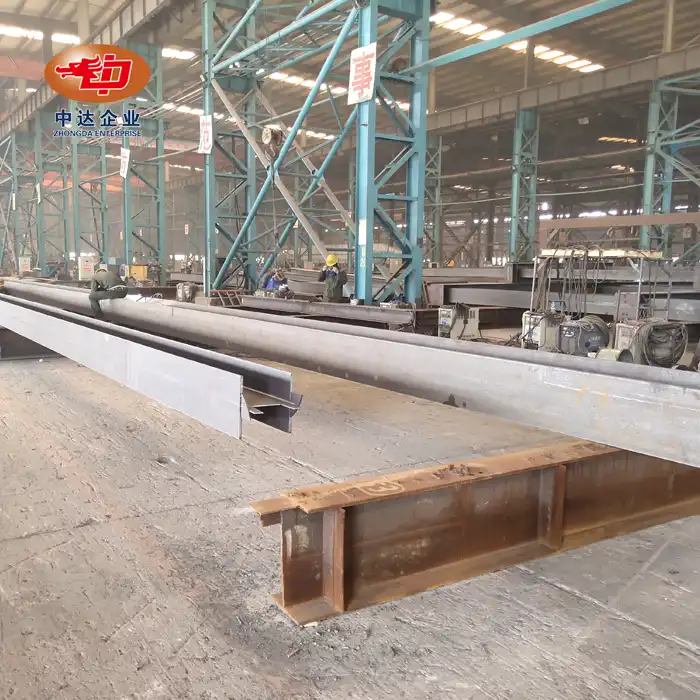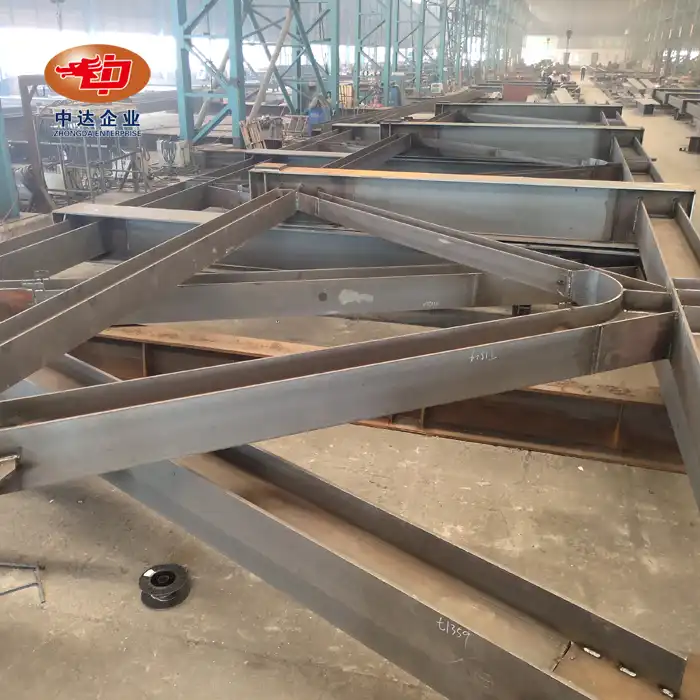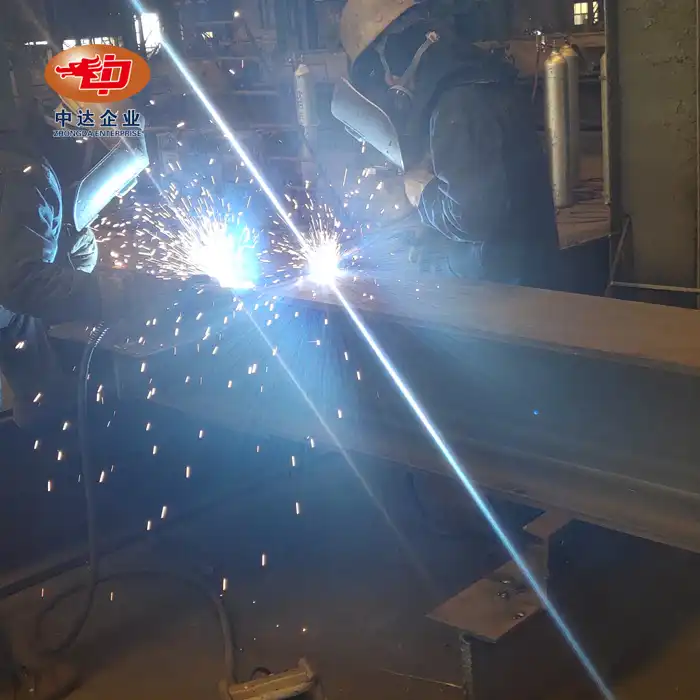The Engineering Marvel of I-Section Beams
Structural Efficiency and Load-Bearing Capacity
I-section beams are marvels of engineering design. Their shape is not just aesthetically pleasing but functionally superior. The wide flanges at the top and bottom of the beam resist bending moments effectively, while the web connects these flanges and resists shear forces. This configuration allows I-section beams to handle both vertical and horizontal loads with remarkable efficiency.
The load-bearing capacity of I-section beams is truly impressive. They can support substantial weights across long spans, making them indispensable in bridge construction and large-scale building projects. For instance, the beams used in the Shenyang Dongta Cross-Hunhe River Bridge, a project utilizing 18,000 tons of steel, exemplify the strength and reliability of these structural elements.

Material Optimization and Weight Reduction
One of the most significant advantages of I-section beams is their ability to provide maximum strength with minimal material usage. This optimization leads to a reduction in overall structural weight, which has cascading benefits throughout the construction process. Lighter structures require less robust foundations, reduce transportation costs, and often allow for easier on-site handling and installation.
Advanced manufacturing techniques, such as those employed by industry leaders like Zhongda Steel, have further enhanced this efficiency. High-frequency welded I-section beams can save up to 15% on steel compared to standard rolled I-beams, without compromising on strength or durability. This material efficiency not only cuts costs but also aligns with sustainable construction practices by reducing the overall carbon footprint of projects.
Versatility in Design and Application
The versatility of I-section beams is unmatched in the construction industry. They can be customized to suit a wide array of project specifications, with web heights ranging from 80mm to 400mm and flange widths from 100mm to 350mm. This flexibility allows architects and engineers to tailor the beams to specific load requirements and aesthetic considerations.
I-section beams find applications in various sectors, from industrial facilities to high-rise buildings. Their adaptability is evident in projects like the Jingha Expressway expansion and numerous industrial plants for state-owned enterprises. Moreover, the ability to fabricate these beams using different steel grades, such as Q235B and Q345B, further extends their applicability across diverse environmental conditions and structural demands.
Advancements in I-Section Beam Technology
High-Frequency Welding Revolution
The advent of high-frequency welding technology has revolutionized the production of I-section beams. This innovative process allows for the creation of beams with superior strength-to-weight ratios compared to traditional rolled I-beams. The high-frequency welding technique ensures fully penetrated welds with staggered seams, resulting in a seamless and robust structure.
Zhongda Steel's state-of-the-art facility employs this cutting-edge technology, producing beams that offer excellent load-bearing capacity and bending strength of ≥345MPa. This advanced manufacturing process not only enhances the structural integrity of the beams but also allows for greater precision in fabrication, meeting the exacting standards of modern construction projects.
Quality Control and Testing Advancements
The production of high-quality I-section beams relies heavily on rigorous quality control measures. Modern manufacturing facilities implement comprehensive testing protocols to ensure the integrity of every beam. For instance, Zhongda Steel conducts 100% ultrasonic testing of welds, providing third-party non-destructive testing (NDT) reports for complete transparency and assurance.

Advanced measurement equipment is used to perform dimensional accuracy checks, ensuring that each beam meets the specified tolerances. Material composition analysis is also carried out to verify compliance with industry standards such as ASTM A992 and GB/T 11263-2010. These meticulous quality control processes guarantee that every I-section beam leaving the factory meets the highest standards of performance and reliability.
Customization and Specialized Treatments
The modern construction industry demands flexibility, and I-section beam manufacturers have risen to the challenge. Customization options now extend beyond basic dimensions to include specialized surface treatments and material specifications. Galvanizing and painting services are available to enhance corrosion resistance and aesthetic appeal, crucial for exposed structural elements or harsh environmental conditions.
Manufacturers like Zhongda Steel offer comprehensive OEM and ODM services, working with custom CAD/3D files to produce both standard and non-standard sizes. This includes the capability to create extra-wide flanges and special cross-sections to meet unique project requirements. The ability to tailor I-section beams to specific needs has opened up new possibilities in architectural design and structural engineering.
The Future of Construction with I-Section Beams
Sustainable Building Practices
As the construction industry moves towards more sustainable practices, I-section beams are playing a crucial role. Their efficient use of materials aligns perfectly with green building initiatives. The reduced material usage not only lowers costs but also minimizes the environmental impact of steel production and transportation.
Innovative manufacturers are exploring ways to further enhance the sustainability of I-section beams. This includes the use of recycled steel in production and the development of beams that are easier to disassemble and recycle at the end of a building's life cycle. As sustainability becomes increasingly important in construction, the role of I-section beams in creating eco-friendly structures is set to grow.
Integration with Smart Building Technologies
The future of construction is smart, and I-section beams are adapting to this new paradigm. Manufacturers are exploring ways to integrate sensors and smart technologies directly into the beams during the production process. These smart beams could provide real-time data on structural health, load distribution, and even environmental conditions within a building.
This integration of technology with structural elements opens up exciting possibilities for predictive maintenance and adaptive building systems. Imagine a structure that can automatically adjust its internal support based on changing load conditions or environmental factors. I-section beams, with their versatile design and adaptability, are at the forefront of this technological revolution in construction.
Pushing the Boundaries of Architectural Design
The continuous advancements in I-section beam technology are enabling architects to push the boundaries of what's possible in structural design. The ability to create custom-sized beams with precision allows for more daring and innovative architectural expressions. From twisting skyscrapers to organically shaped structures, I-section beams provide the strength and flexibility needed to turn ambitious designs into reality.
As computational design and parametric modeling become more prevalent in architecture, the customizability of I-section beams becomes even more valuable. Architects and engineers can now optimize beam designs for specific load conditions and aesthetic requirements, creating structures that are not only functional but also visually striking. The future of architecture is being shaped by these advancements, with I-section beams playing a central role in bringing bold visions to life.
Conclusion
I-section beams have earned their preferred status in the construction industry through a combination of structural efficiency, versatility, and continuous innovation. From their basic design that maximizes strength while minimizing material use, to the advanced high-frequency welding techniques that enhance their performance, these beams are essential components of modern infrastructure. As we look to the future, I-section beams will continue to evolve, incorporating new technologies and sustainable practices to meet the changing demands of the construction industry. Their role in creating safer, more efficient, and increasingly ambitious structures is assured, cementing their place as a cornerstone of engineering excellence.
Contact Us
For cutting-edge I-section beam solutions that push the boundaries of structural engineering, turn to Zhongda Steel. Our state-of-the-art high-frequency welded I-section beams offer superior strength, customization, and sustainability. Experience the difference that industry-leading expertise and a commitment to innovation can make in your next project. Contact us at Ava@zd-steels.com to discover how our precision-engineered steel solutions can elevate your construction endeavors.














